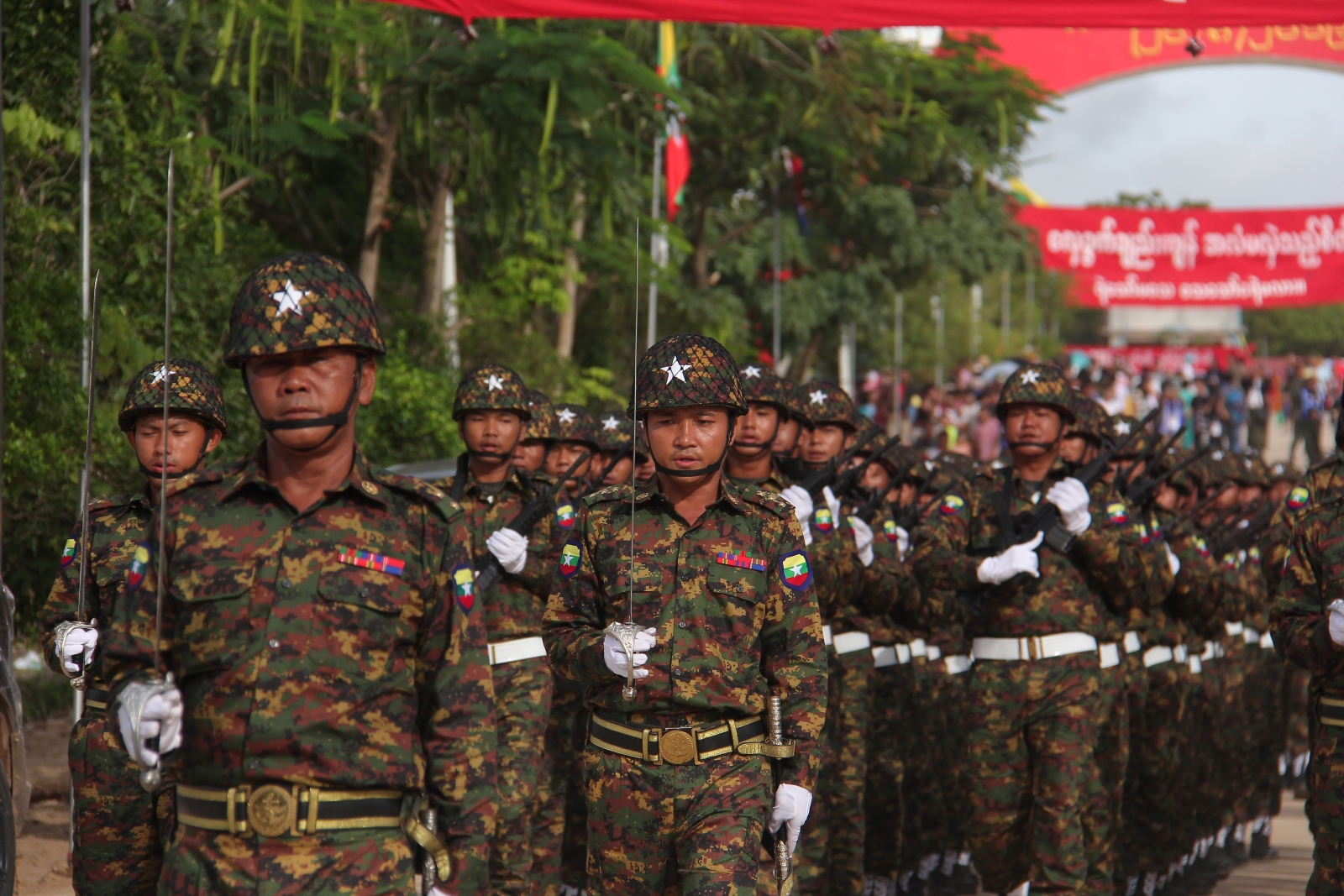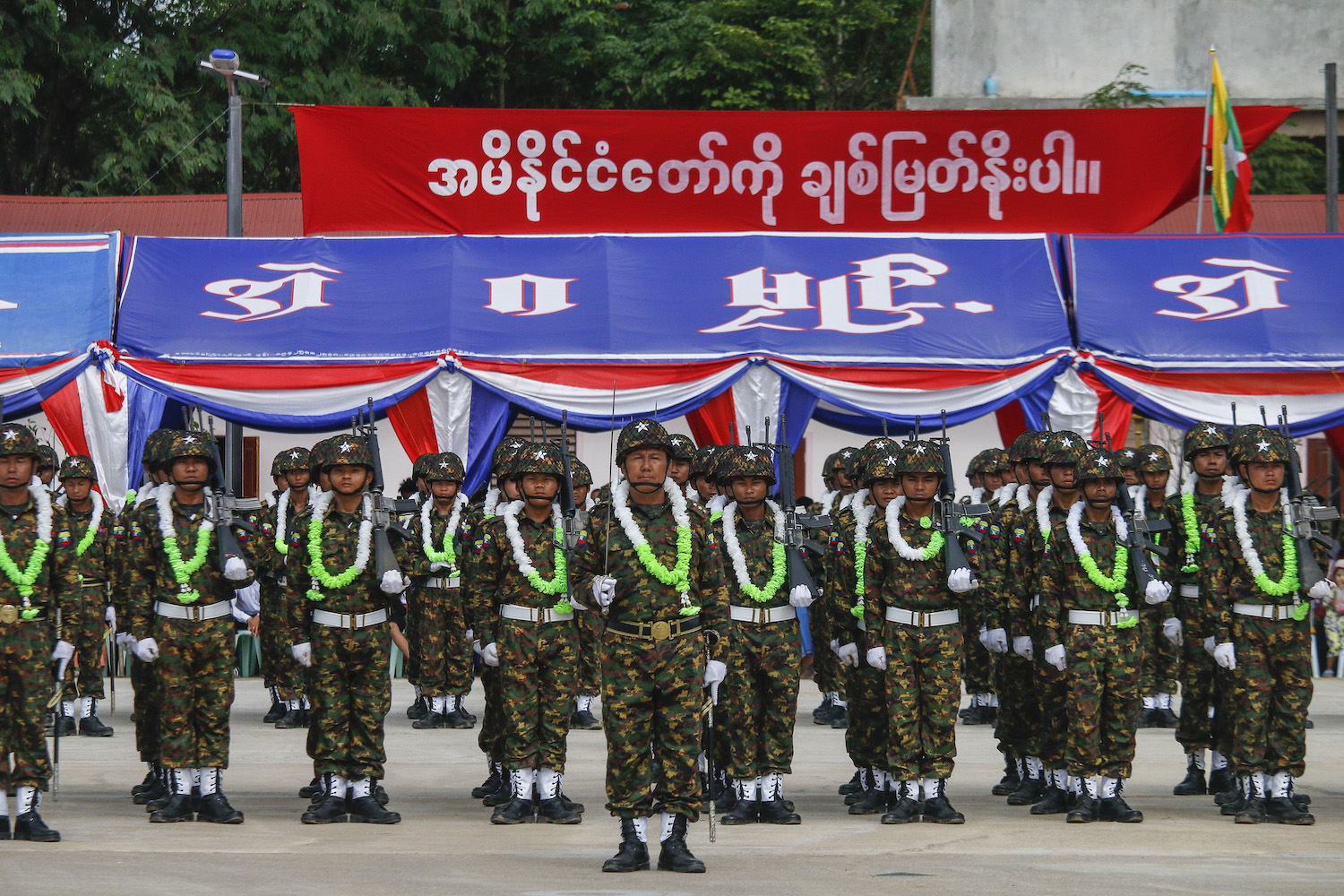Utility cuts and a China-driven regional crackdown have dealt a blow to online gambling and scam operations on the Thai-Myanmar border, but a series of workarounds have kept the notorious industry going.
By FRONTIER
Looking out across the Moei River from Thailand, the infamous gambling and scam centres of Myanmar’s Myawaddy Township appear closed at first sight. But appearances can be deceiving in this lawless section of the border.
In early June, Thailand cut off the electric power it supplied to the centres, located in grand casino compounds on land controlled by the Kayin State Border Guard Force, a militia under Tatmadaw command. Shortly afterwards, Thai authorities severed cross-border internet access. Those cuts were part of multinational attempts over the past year to crack down on the online scam and gambling industry, and the human trafficking that comes with it.
The measures have struck a blow to this illegal industry, but not a fatal one.
When Frontier visited the Thai border town of Mae Sot, opposite Myawaddy, in late August, Thai soldiers at boat terminals along the river separating Thailand and Myanmar seemed to be on high alert. A soldier, who refused to give his name, said that for weeks after the power was cut, the Myawaddy casino compounds appeared inactive during the day, but at night the lights came on and it was obvious they were still up and running.
Since the beginning of August, though, the casinos have stayed dark even at night, he said. Yet what appeared to be brand new generators could be seen in the compounds. Residents told Frontier that these generators were keeping operations alive, even if there was less power to spare for lighting, while one scam worker said she and her colleagues had relocated to a hotel in Myawaddy town, where their work continued. Meanwhile, the partly junta-owned telco Mytel had stepped in to build new internet infrastructure.
As we talked with the soldier, we could hear the boom of artillery and air strikes on the Myanmar side of the border, as the Myanmar military was trying to recapture an outpost taken in late July by resistance forces led by the Karen National Liberation Army. But that’s not the main reason the Thai military was standing guard. The Thai soldier said that recently people had been dumping corpses into the river at night – including two he had personally found in July.
“I didn’t see the bodies being dumped, but I saw them when they were bloated and decaying, washed up on the Mae Sot side of the river,” he said.
Workers are often lured to the casino compounds by false promises of safe, well-paid work. Those who’ve given testimony after fleeing or being rescued have said they were beaten or shocked with electric probes for trying to leave or refusing to work. Many bore signs of torture and abuse.
Within our sight was the Kosai Casino, from which two trafficked Lao nationals escaped in April, sharing videos in which they were chained to a concrete post and repeatedly shocked for not meeting their quotas with taser-like devices until they collapsed.
But some meet even worse fates. “They were rotting and disfigured,” the Thai soldier said of bodies he had recently found. “You couldn’t even make out their faces.”
He said the Thai troop presence had increased immediately following coverage of the Kosai escapees, with at least five soldiers now guarding each crossing point along the river. He then pulled out his phone and began scrolling through several photographs of dead bodies.
When Frontier tried to snap photos of the soldier’s phone, he refused.
“If you want details, ask the government,” he said. “I’m just showing you what I’ve seen on duty.”

The wrath of Beijing
Since 2020, when the COVID-19 pandemic shut retail operations globally, many border casinos have pivoted to online gambling and scams. Alongside financial fraud, the move has been accompanied by a growth in human trafficking.
These criminal enterprises are part of regional industry, with similar hubs in Laos and Cambodia. In Myanmar, though, the trade has grown exponentially since the February 2021 coup, as the country has descended into civil war and lawlessness.
Apart from the scam centres of Myawaddy in Kayin State, similar operations have flourished to the north in Shan State, along Myanmar’s border with China, where territory is contested by an array of armed groups. Frontier has reported on people being trafficked to work as scammers in areas of Shan controlled by the United Wa State Army, whose troops also helped to guard the operations.
People lured into work at the online gambling and scam centres come from countries all over Asia, but many – if not most – of them are Chinese nationals. They are hired for their language skills, which allow the centres to target their most prized victims – members of the Chinese public.
The large numbers of Chinese being scammed by, or trafficked to, these centres have prompted Beijing to browbeat Southeast Asian countries into taking action.
On August 15 and 16, members of the Myanmar and Thai police joined officials from China’s Ministry of Public Security and the Lao Public Security Department in Chiang Mai, Thailand, to discuss cooperation on the issue. Ten days later, the Chinese embassy in Myanmar announced that the Myanmar police had handed over 24 Chinese nationals, although it did not say where the arrests were made.
But despite well-publicised roundups like this, the regime’s commitment remains in serious doubt. This is because many of the illegal operations are in territories controlled by allied armed groups such as the Kayin State BGF, which offers the military crucial support in its fight against the KNLA.
The junta-appointed administrator for Myawaddy District U Soe Tint told Frontier on August 28 that a team of police, soldiers and local officials are actively inspecting the casinos there. He said several had already been inspected, but no crimes were uncovered.
However, these probes suffer from a critical limitation. “We have to coordinate with the Border Guard Force and others first. We can’t just enter the casinos [unannounced],” he said, suggesting that the BGF would have ample opportunity to hide evidence of criminality beforehand.
Soe Tint said to contact him within two weeks for an update, but on September 3 he was killed by a resistance drone attack on Myawaddy town. Three days after his death, one of his colleagues at the district administration told Frontier on the condition of anonymity that the casino inspections had been put on hold.
Given this questionable level of commitment, China may expect closer cooperation from ethnic armed groups in Shan, whose proximity to (and heavy reliance on) the Chinese border grants Beijing considerable leverage.
These groups include the UWSA, which, despite its alleged involvement in the industry, has in recent weeks been rounding up alleged scammers at China’s behest. The UWSA did not respond to Frontier by press time, but the group’s media outlets have reported on the arrest of 1,207 alleged scammers from China that they then handed over to Chinese authorities. However, it’s unclear how many of these supposed criminals are senior operatives, as opposed to low-level recruits who might have been trafficked to Wa territory.
In addition, Chinese authorities have asked the Ta’ang National Liberation Army, also based in Shan, for help in combating the industry, said TNLA spokesperson Major Tar Aik Kyaw. However, he denied there was any such activity taking place in TNLA territory.
“I think these gambling businesses operate not just at the border, but also in big cities like Mandalay and Yangon, so the problem will not disappear just by cracking down in border areas,” he said.
Radio Free Asia revealed in September that a Chinese criminal gang was running a scam centre in Yangon, Myanmar’s commercial capital, with employees using fake social media accounts to have “sex chats” with prospective victims to gain access to their accounts.
This indicates the extent of corruption and lawlessness in Myanmar since the coup. However, the large majority of reported scams centres are in the country’s borderlands, and this is where the crackdowns have been focused.

Temporary lifelines
Despite many reported trafficking cases, some of the workers in the online gambling and scam centres are there voluntarily. One of them, Yangon native Ma Lae Lae*, described an industry that – for the moment – continues to thrive amid the regional clampdown, thanks to a number of workarounds.
Lae Lae has been working since April 2021 at the Myawaddy Complex, a sprawling compound of restaurants, casinos and a hotel on the river in Myawaddy Township. She began as a digital customer service agent, explaining to online gamblers how different games worked and how to buy gaming tokens.
Early last year she was promoted and now tricks people into investing in bogus companies, scamming them out of their money, she told Frontier. The new role doubled her salary, from 15,000 Thai baht (US$400) to more than 30,000 baht a month.
For most of the time, she’s lived in a dormitory with four others within the compound and been allowed outside just once a month. Still, she said she’s glad with the job, which pays more than she can earn in Yangon.
She said she knows other women there who have to perform sex for money, and she’s happy that she at least isn’t doing that.
“The thing about having to cheat people out of money is that, yeah, it’s dishonest, but the online gambling work I used to do isn’t good either, so I thought I might as well make more money if it’s bad either way,” she said, describing the blurred line between scamming and online gambling operations. The latter often deceive gamblers about the odds stacked against them, if they offer any returns at all.
“I’m not the only one,” she added. “Others are working in the same way, so why shouldn’t I?”
In late July, as the power and internet cuts by Thailand were beginning to bite and the threat of inspections loomed, her boss told her and her colleagues they had to temporarily relocate because of a “security situation” he wouldn’t elaborate on. Now she lives and works in a paid-for hotel room outside of the compound with just one other colleague.
“We’re happy, because it’s the first time we’ve gotten to move in the years I’ve been working here,” she said.
Because the hotel is close to the Thailand-Myanmar Friendship Bridge-1, Lae Lae gets to cross the border often to go shopping in Mae Sot. “It’s fun, because I get to go outside now,” she said. “I feel like I’m on a vacation.”
But despite the sudden relocation, the electricity and internet cuts by the Thai authorities don’t seem to be hampering operations. Lae Lae said any power cuts she’s experienced have been temporary, with generators keeping most things going.
She said her internet connection is Myanmar-based, and residents of nearby Shwe Kokko told Frontier on September 20 that new Mytel towers that began being installed in March have been supplying internet to the scam centres since July.
However, the cost of running generators and other workarounds puts the sustainability of the businesses in question, especially when combined with continued Chinese pressure on local authorities to rein them in.
“Reducing access to Thai utilities is an important, if not fully sufficient, way to drive down the extremely high profit margins driving proliferation of the scamming industry and its many abuses,” said Mr Jacob Sims, a senior technical advisor at anti-trafficking organisation International Justice Mission. Referring to the Thai internet cuts, he said “connectivity from homegrown towers is likely weaker and more expensive.”
“If these cuts end up being temporary or other work-arounds pop-up to access Thai cellular data, the impact will be lessened,” Sims told Frontier. “Consistently blocking access to Thai infrastructure – alongside restricting flows of trafficked workers across Thai borders – is key.”
*indicates use of a pseudonym for security reasons







